News
STA, 9 January 2019 - Plastika Skaza, a Velenje-based company specialised in plastics products, last year exceeded EUR 40m in total revenues for the first time in its 40-year history, while pre-tax profit was up seven-fold to EUR 1.4m, the company announced on Wednesday.
Speaking to the press in Ljubljana, the management noted that revenues were up by 4% last year, adding that in 2019, Plastika Skaza intended to enter the German market and continue with investments in research and development.
"The goal for this year is to generate EUR 50m in revenue, driven by growing sales of our own brand, which currently represents 8% of total sales," sales director Mirela Kurt told the STA.
In this segment, the company gained 18 new clients and recorded sales growth of 70% last year, she noted.
The company employs 368 people and sells around 90% of its products abroad, mostly in Scandinavian markets.
Last year, Plastika Skaza invested a total of EUR 1.1m, mostly to machines and equipment, automation and development of a smart plant. This year investments are planned to stand at EUR 1.2m.
The company has abandoned production for the automotive industry and now focuses on the furniture and electronics industry, while putting an emphasis on biomaterials and recycled materials for its products.
Below is a review of today’s news in Slovenia, summarised by the headlines in the daily newspapers for Thursday, January 10, 2019, as prepared by the STA:
DELO
Person of the year
"Thank you for supporting good medicine": Delo declared Ljubljana aesthetic surgeons Uroš Ahčan and Vojko Didanovič its persons of the year for their extraordinary achievements in reconstructive surgery and dedication to their profession. The ceremony was the starting shot for a year of celebrations, as the newspaper turns 60 this year. (front page, 6, 7)
DNEVNIK
Healthcare
"Gorenjska joins the payment wagon": Gorenjska has joined the growing number of regions which will charge for non-emergency treatment at the ER and in emergency care units of community health centres. Estimates show over half the patients visiting emergency care centres over the weekend are not urgent cases. (front page, 10)
Italy-Poland ties
"Italian minister Salvini wants to build new European axis": Italian Interior Minister Mateo Salvini indicated with his visit to Poland yesterday he wanted to expand the coalition of euroskeptical parties to Europe's east, stressing that Italy and Poland would be the main protagonists of a "new European spring". (front page, 6)
Pet store bankruptcy
"Will the pet stores close?": Vetpet, a company running 23 Zootic pet stores nationwide, has filed for bankruptcy after preventive restructuring failed. It is unclear what will happen to the over 100 employees and whether the stores will remain open. (front page, 5)
FINANCE
Loans for small companies
"EUR 12m for microloans": The Slovenian Enterprise Fund has issued a call for applications for microloans. EUR 12m is available in the first tranche, with the total through 2023 standing at EUR 42m. (front page, 2, 3)
New tourist tax
"How we will spend it and how you can make money off of it": A new tourist and promotional tax was introduced on 1 January. The bulk of the funding will be used for promotional purposes, and some of the promotional tasks will be contracted out to agencies. (front page, 8)
Oil prices
"Oil's revival in first days of new year": Oil prices grew by over a fifth in the first two weeks of 2019, which means prices at the pump are likely to rise next week. (front page, 10, 11)
Healthcare
"Stop for transactions with private practitioners?" The Celje General Hospital wanted to outsource MRI services to a private practitioner after its device broke down, but now the Health Insurance Institute (ZZZS) says public funds cannot be used for services rendered by doctors without a concession. (front page, 5)
VEČER
Flu season nearing peak
"Most flu shots for the elderly": Health authorities expect that flu season, already in full swing, will peak in late January and early February. The elderly are the age group most at risk, and they account for the bulk of individuals coming in to get last-minute flu shots. (front page, 2, 3)
Magna paint shop permit
"Magna facing a test yet again": Austro-Canadian car maker Magna's paint shop outside Maribor is at the cusp of getting all the requisite permits and test production was expected to be launched in January, but a local environmentalist had announced he will lodge a complaint against the environmental permit, which could delay the start of production. (front page, 5)
Koper prison break
"Harsh criticism of prison management": The Prison Administration has issued a scathing report after two inmates escaped from Koper Prison. The inquiry showed the management as well as the wardens neglected their duties, while wardens claim security systems are outdated and inadequate. (front page, 21)
STA, 9 January 2019- The EU's future and challenges such as Brexit, migration and the upcoming Euro elections topped the agenda as Prime Minister Marjan Šarec received the visiting Cypriot President Nikos Anastasiadis on Wednesday.
According to the prime minister's office, the two officials called for a strong, unified and more effective EU, one that respects the values and principles underlying its foundation.
They agreed that migration was a problem common to all, so it should be addressed through a common, systematic and sustainable approach with the involvement of all member states.
Pleased to meet in #Ljubljana PM Marjan Šarec. #Cyprus highly values its excellent bilateral relations with #Slovenia. I look forward for more bilateral exchanges so as to enhance our cooperation in specific fields of common interest, such as education, tourism, health & trade. pic.twitter.com/1LlaSvVKLF
— Nicos Anastasiades (@AnastasiadesCY) January 9, 2019
Slovenia's position is that it is necessary to enhance cooperation with third countries, especially in Africa, in a bid to tackle the root causes of mass migration, and to protect the EU's external borders.
Šarec and Anastasiadis agreed that the Brexit agreement with the UK was the best possible, but they expressed the concern that the UK may leave without a deal.
The pair also expressed concern about growing populism in Europe, agreeing that the developments made the elections to the European Parliament in May the more important.
They also touched on the situation in the Western Balkans with Slovenia's position being that the prospect of EU membership for the region was an important motive for peace and stability in this part of Europe.
Anastasiadis also met parliamentary Speaker Dejan Židan. Their meeting also revolved around the future of the EU and the upcoming elections. The pair also touched on the rise of right-wing populist movements in the bloc, the National Assembly said in a press release.
Over lunch, the speaker and the president also talked about the countries' healthcare systems and the importance of improving healthcare, and touched on the Middle East.
Skrbovin’ca is new project run by the City of Ljubljana and four day care centres for people with disabilities. It’s a good reflection of how the city has changed over the last few years with regard to how it considers the needs of all members of the community. And while these changes are the results of the efforts of many people, it’s notable that the City’s Mayor, Zoran Janković, has taken a personal interest in the matter.
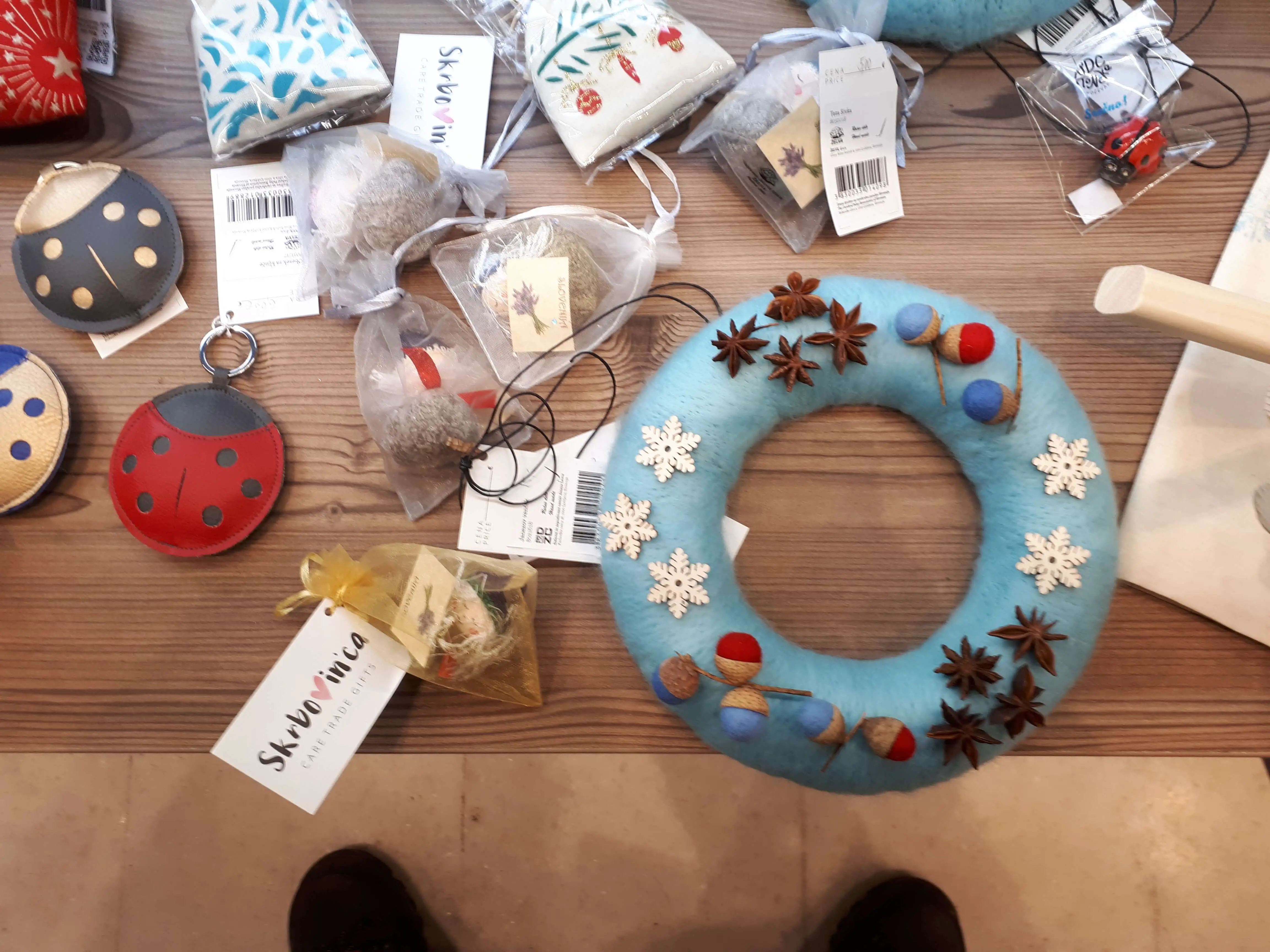
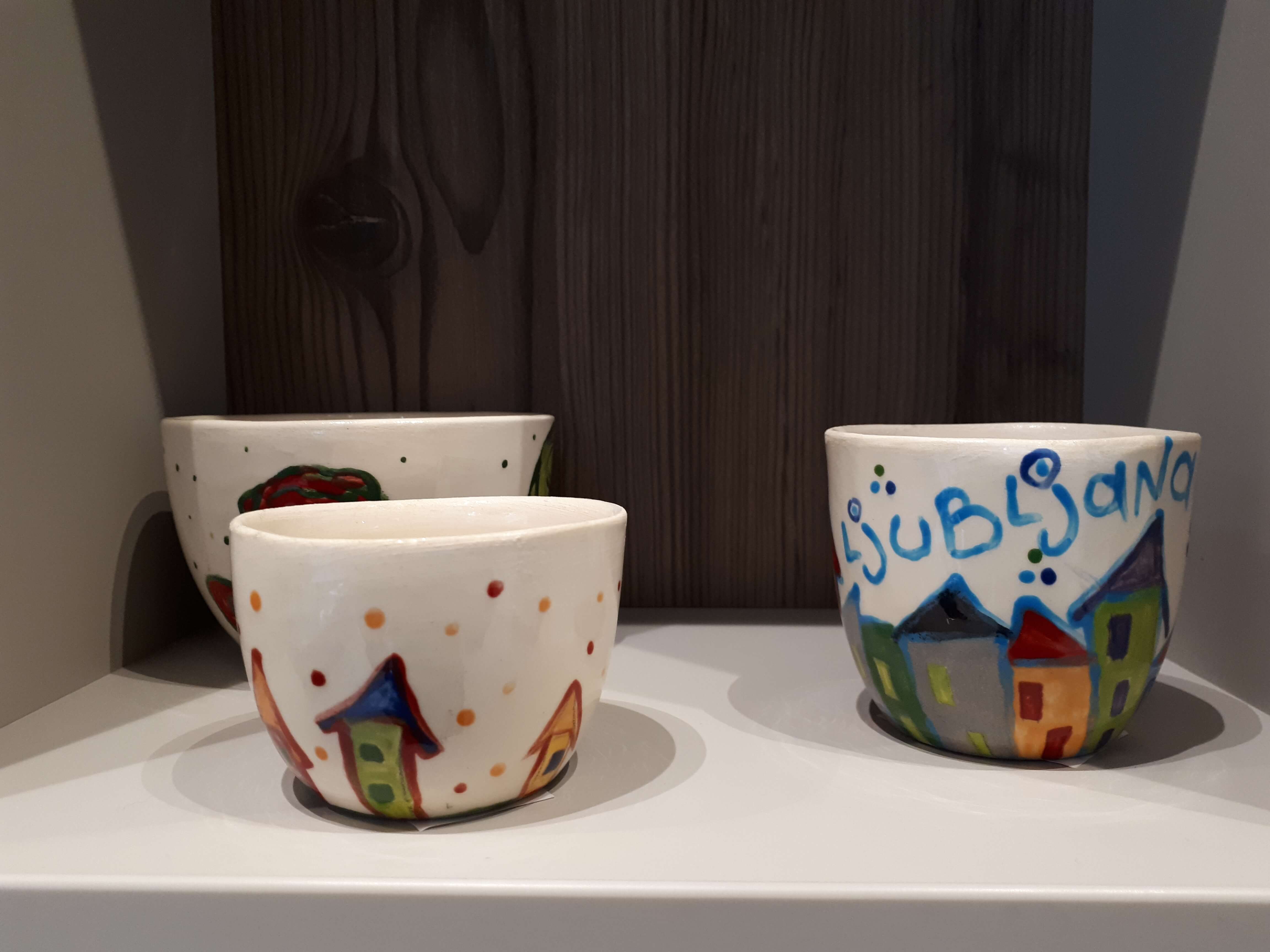

Skrbovin’ca, which means “care trade”, is a multifunctional space that at first pass looks like a souvenir store, albeit one selling handmade items rather than mass-produced factory goods of unknown origin. Here you’ll find the creative products of Slovenians with various disabilities, physical and cognitive. In addition to making the items on sale, people with special needs also work as shop assistants, consultants, mentors and in other positions, gaining valuable experience and connections, becoming more engaged with the community they live in.
Related: What's on in Ljubljana this week
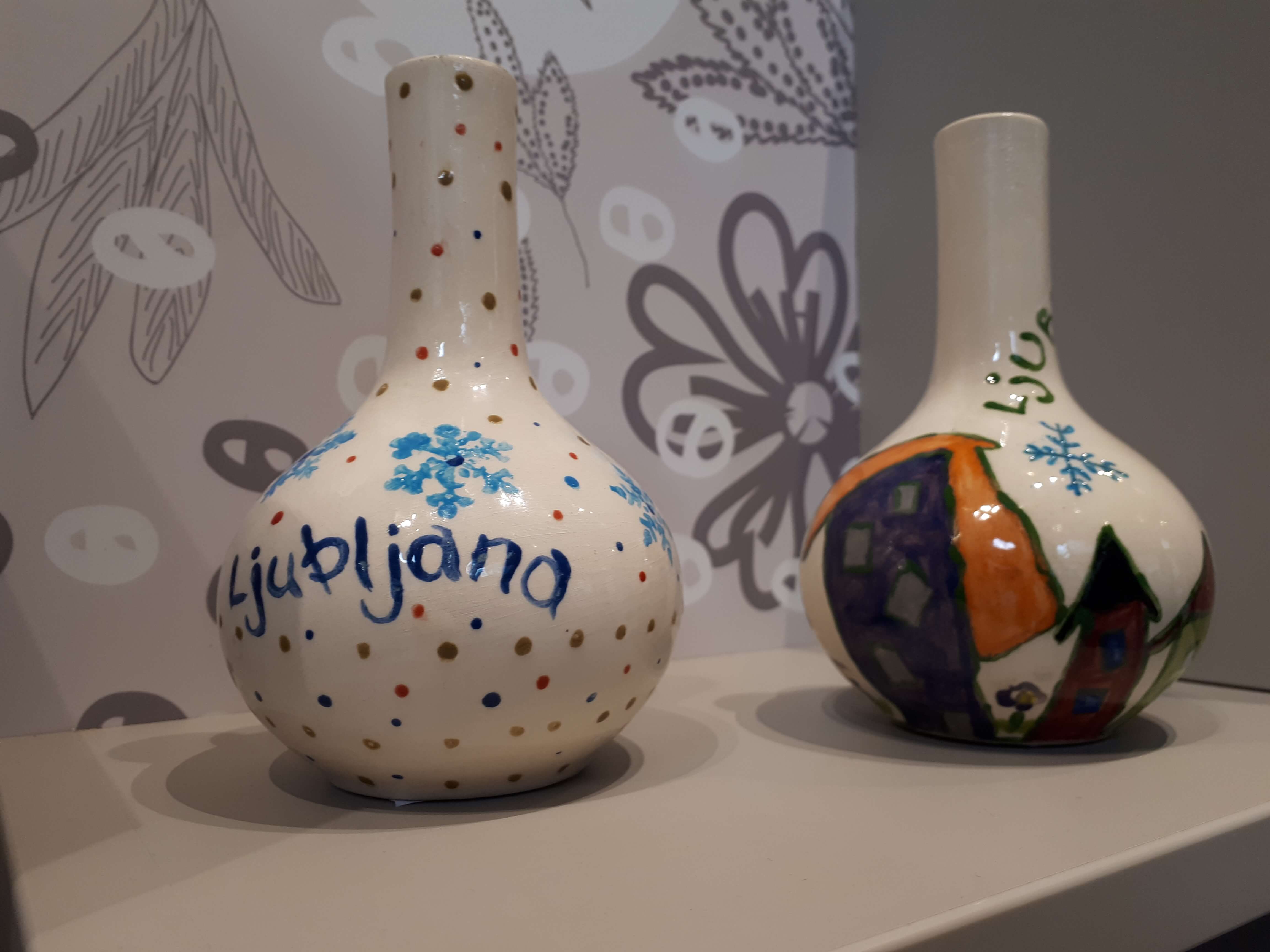


What’s more, it’s located right in the heart of Ljubljana, in the same building as the Tourist Information Centre by the Triple Bridge, on the corner nearest Town Hall (opposite Vigo ice cream store, to be exact), and is also one of the city’s official Info Points for those aged 65+ (although anyone, of any age, is assured of a warm welcome and somewhere to rest inside).
When I visited I met with Emir Okanović, the man who works there on most days and is able to provide assistance in five languages, chatting to me in perfect English and then slipping into German or French as needed when others arrived (he also speaks Serbian).
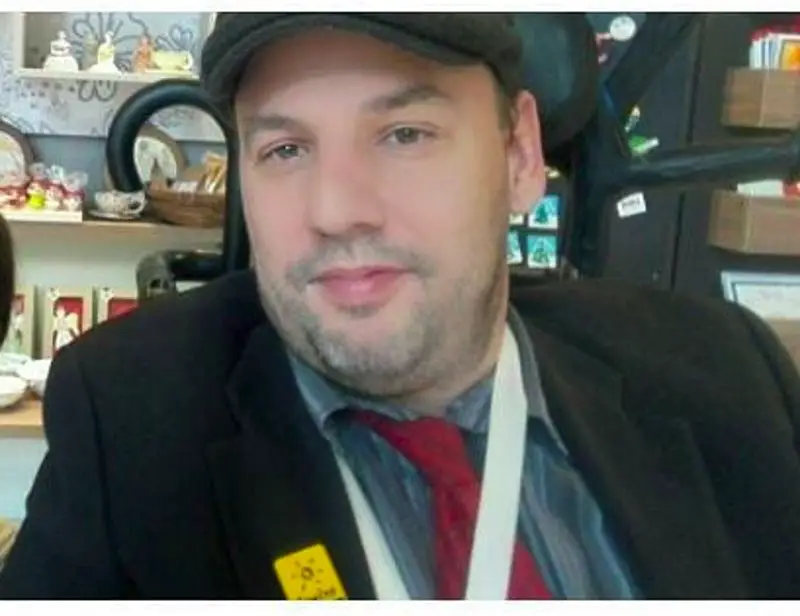
Emir Okanović. Photo: Emir Okanović
Emir was keen to stress the City’s support for this project, which was run on a trial basis for the first year or so, a test that it passed before officially opening in late 2018. He also noted that the tourist population, like that of Slovenia and developed nations in general, is aging, and that meeting the needs of such visitors makes economic sense, as well as making the city more accessible and welcoming to all.
Related: Ljubljana by Wheelchair - New App Highlights Most Accessible Spots in the City
“Ljubljana by Wheelchair [another City-sponsored project, as reported here] focuses on physical disabilities and mobility, but they tend to forget other disabilities, such as impaired hearing or vision, and especially people with combined disabilities, who are physically and mentally disabled. At Skrbovin’ca we take a different approach. We work with combined disabilities, so there are limits to what people can do and we have to work within these, but that’s also the niche we’re trying to fill, because this is a community that’s rather neglected, and is often otherwise unemployable. The items here are made on a production line basis, with strict quality control, and the producers are paid for their work.”

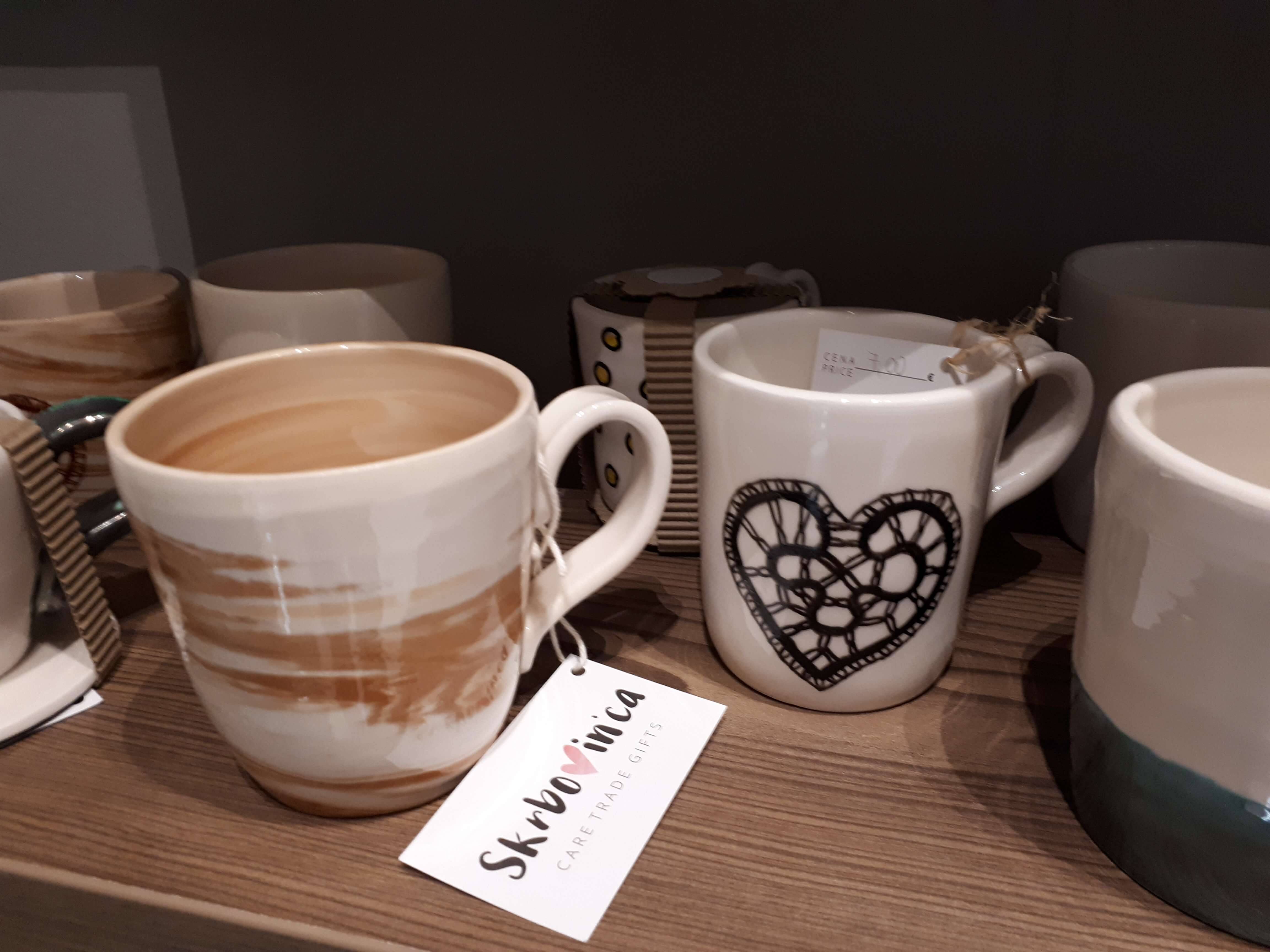

I visited in December
In short, Skrbovin’ca is a very welcome addition to the downtown area, and a hopeful sign that in the years ahead, as Ljubljana continues to grow as a tourist destination, the needs and concerns of all its residents and visitors will be listened to. The store and information centre is open from 10:00 to 20:00, and can be found at Mačkova ulica 1, 1000 Ljubljana. You can visit the Facebook page here, and the Instagram here.
STA, 9 January 2019 - After the Constitutional Court recently decreed a reform of the electoral law to re-establish the one-person-one-vote rule, the new chief justice Rajko Knez told the STA in an interview that introducing a preference vote in the general election would go in the right direction.
In its December ruling, the court declared the legislative provisions determining the size of electoral districts unconstitutional because their varying sizes meant that the votes of constituents who cast their ballots in smaller districts count more than those of constituents in larger districts.
Slovenia has ten electoral units, two of which are set aside for the Italian and Hungarian minorities to elect each their own MP. Each of the remaining eight units is divided into eleven districts to elect 88 MPs.
The court ordered the National Assembly to amend the legislation within two years. While it did not say how, the belief is the legislature may either change the sizes of the electoral districts or abolish them and introduce a preference vote at the level of the larger electoral units.
Speaking to the STA after assuming his three-year term as president of the Constitutional Court in December, Knez said it was not up to the court to say which solution would be the most suitable.
"However, introducing preference votes would go in the direction set out by the Constitutional Court because preference vote increases the individual's say on the outcome of the vote," he said, quoting a constitutional provision saying that voters should have a decisive say on which candidates get elected.
Chief Justice suggests reducing duties of the Constitutional Court to streamline its work
Knez would like for the Constitutional Court to be able to speed up processing of cases, which he says would be possible by reducing the scope of cases that the court has to admit. However, this would require amendments to the relevant law as well as to the Constitution.
"The Constitution, in Article 160, imposes a great number of responsibilities on the Constitutional Court, something that is perceived as peculiar by some of our colleagues abroad. It would be worth considering amending the article, or reinforce the court's staffing.
"One possible solution would be to limit constitutional appeals against court decisions to decisions of only certain courts, for example to those of the Supreme Court or those of the Administrative Court, as is the case in Austria."
However, Knez is somewhat reserved about the idea that Constitutional Court judges should be given the discretion to choose themselves which cases they would hear and which not.
Knez has already talked to Prime Minister Marjan Šarec about the need for changes and he says Šarec was open to suggestions, but no concrete steps have been taken yet. "I'd like for the government and parliament to hear us. Data on court case resolution time and the growing caseload call for action."
One of the things the court is deliberating on at the moment is whether to step up sanctions for the failure to implement the late-2014 ruling decreeing full state funding for private primary schools with publicly-approved curricula.
The National Assembly has already sent in its response, which means the case may be prepared for deliberation at a Constitutional Court's session, but Knez could not say when this will happen, because much depends on the rapporteur judge responsible for the case, but the matter is treated as an absolute priority.
The appearance of impartiality must be preserved
Knez, who has served as a judge on the Constitutional Court since April 2017, is not opposed to public appearances by judges, but advises restraint and preserving the image of impartiality, something that he believes judges stick to.
"We are as a rule careful where to appear and what to say, which is right," Knez says, so he does not see the need to place any additional restrictions on public appearances.
Asked to comment on an opinion aired by former Constitutional Court president Miroslav Mozetič about declining democracy and rule of law in the country, Knez said that he believed Slovenia to be a law-governed country.
"We can talk about whether there's more or less rule of law, but the fact is that mistakes also happen in older democracies," Knez said although this does not justify systemic mistakes.
Slovenia’s young legal system is a work in progress
In cases he has encountered so far Knez as a rule has not come across obvious or intentional abuse of the Constitution in decision-making, but there are "often mere nuances in understanding constitutional norms".
If there are violations, the reason may be legislation, legal voids. "We started building the Slovenian legal system only 28 years ago, which is a relatively short period of time. In 1997 we started adapting to the European system (...) Given the circumstances, it would be an illusion to expect nothing would go wrong."
Knez supports the introduction of a trial term for judges and conditionally also the transfer of appointments of judges from parliament to the Judicial Council, both of which are planned for this year, but he opposes limiting judges' terms once they are awarded a life-long tenure.
To prevent the judiciary shutting itself in when appointments are taken to the Judicial Council, Knez proposes fully professionalising the body and enhancing its independence by appointing relevant external members.
"Every system that within its frameworks functions as its own master may go awry in the long run, getting entangled in its own paradoxes and partial interests," the justice warns.
STA, 9 January - Questions are being raised in Slovenia about the adequacy of criminal law and judicial discretion after it was reported that a man who raped a drunk woman was charged with criminal coercion rather than rape because the woman, passed out drunk in the man's apartment, did not - and could not - resist.
Dnevnik reported earlier this week that a man from Koper was sentenced to ten months in prison for raping a family friend, who was passed out drunk in the children's room in his apartment.
Testimony suggests the woman woke up after he had already undressed her and started raping her; she tried to resist but he continued to force himself upon her until he completed the deed.
While such an act would be widely expected to result in a rape conviction, the court had a different view and after a series of appeals that went all the way to the Supreme Court, the perpetrator ended up being convicted of a crime that is not even classified as a sex crime.
“Not rape when the perpetrator uses force after the sexual act has already begun”
In the last sentence handed down by the Koper Higher Court after the appeals, the judges held that it was not rape when the perpetrator uses force after the sexual act had already begun, which is why he was convicted of criminal coercion.
In this particular case, this in effect means that the drunk woman sleeping, waking up only after he had already started to rape her, was an attenuating circumstance for the perpetrator.
The crime occurred in 2015 and the bulk of the court procedures took place in 2017.
The case raises a series of questions, most notably about the definition of rape in the Slovenian criminal code.
As Dnevnik emphasises, the law says that rape occurs when a perpetrator coerces the victim into sexual intercourse with force or with serious threats. There is no mention of consent at all.
The current Slovenian criminal code was adopted in 2008 and revised several times since then, most recently in 2016, but the definition of rape has not changed.
Mirjam Kline, the head of the department for juvenile and sex crime at the Ljubljana District State Prosecutor's Office, told Dnevnik the model of coercion in place in Slovenia was outdated.
"It is also unjust because we always focus on the victim: how she resisted to make the perpetrator interpret that as resistance and knew this was against her will," she said.
Matjaž Ambrož, a professor of criminal law at the Ljubljana Faculty of Law, meanwhile pointed out for the Delo newspaper that the Higher Court had argued in the retrial the act constituted rape, but procedural constraints prevented it from re-classifying the crime after the District Court had already reduced it to attack on a feeble person.
Calls for a redefinition of rape
Several media have stressed that in countries such as Germany and Sweden the criminal code has already been changed to focus on consent, which would make sense in Slovenia.
This point was also raised by the Association for Non-Violent Communication, which called for a redefinition of rape.
"We know from our work with victims of sexual violence that rape is often caused without coercion ... in particular between sexual partners, where perpetrators commonly use indirect forms of coercion and threat," they said.
Despite the calls for change, the Justice Ministry said no changes were on the horizon at the moment since focusing on consent would be even more difficult for courts to process given that rapes are typically crimes without witnesses that rest on testimony by the victim and the perpetrator.
But it later said it took comments by the expert public to heart and would host a meeting next week to examine possible changes to the criminal code. "We expect them to present their views on the subject. Based on the conclusions of the meeting, we will be able to provide an estimate about potential shortcomings of the valid legislation and requisite measures," the ministry said.
The response came after public outcry over the case started escalating and several groups took up the cause.
Amnesty International Slovenije, an NGO, publicly called for changes to the criminal code that would be "compatible with international human rights standards, meaning it would be based on the absence of consent."
Institute 8 March, an NGO fighting for equal rights, launched an online petition demanding legislative changes based on consent that garnered over 1,000 signatures within hours, and the Left, an opposition party, initiated a formal motion asking the government to change the legislation according to the "no means no" model of consent.
STA, 8 January 2018 - The Celje Higher Court has upheld a court ruling under which Democrat (SDS) leader Janez Janša has to pay RTV Slovenija journalist Mojca Šetinc Pašek 6,000 euro in damages for an offensive tweet. The damages are now final and he will also have pay the costs of the appeal procedure.
In a civil lawsuit brought against Janša by Šetinc Pašek, the Velenje Local Court ordered Janša in November 2016 to pay her the 6,000 euro, setting a 15-day deadline.
In March of the same year, Janša posted a tweet labelling editor Šetinc Pašek and journalist Eugenija Carl "washed up prostitutes" who offered their "cheap services" to the public broadcaster.
Na neki FB strani javne hiše ponujajo poceni usluge odsluženih prostitutk Evgenije C im Mojce PŠ. Eno za 30€, drugo za 35€. #ZvodnikMilan.
— Janez Janša (@JJansaSDS) March 21, 2016
This was after Carl run a report on the SDS, which Janša found "containing a bunch of despicable lies about SDS members".
The latest ruling comes after a tug-of-war in which Janša had claimed he had missed the deadline to respond to the lawsuit because it was not handed to him in the standard procedure.
He had also disagreed with the sum he should pay, arguing the tweet could not have caused such anguish to Šetinc Pašek to warrant such high damages.
The Higher Court has now upheld the original ruling and also established that the lawsuit had been handed to Janša in the right manner.
It also agreed the tweet was offensive and going considerably beyond the freedom of speech, with its only intent being "insulting the claimant in the general public".
A similar lawsuit had been brought against Janša by Carl, but in her case, the Celje Higher Court sided with Janša's appeal, ordering a retrial last November.
Both journalists had also filed criminal lawsuits against Janša over the tweet.
In November, the Celje District Court sentenced Janša to a three-month suspended prison sentence on one-year probation for defamation and ordered him to pay for the costs of the trial. Janša's lawyer Franci Matoz announced an appeal.
All our stories about Janez Janša are here
STA, 7 January 2019 - The URI Soča rehabilitation centre in Ljubljana launched on Monday a new device for gait rehabilitation for severely impaired neurological patients. The Lokomat device provides supported, automated and computer-guided training for persons with impairments of the central and peripheral nervous system who are not able to stand or walk independently.
"The robot connected with virtual reality enables gait training for patients who would otherwise not be able to start it so early into rehabilitation," URI Soča medical director Helena Burger told the STA at the ceremony.
The device will make rehabilitation and its effects faster, as it ensured highly intensive learning with numerous repetitions of a steady and symmetric gait.
URI Soča director general Robert Cugelj added that they wanted to establish a centre of modern technologies by 2020, which would provide patients with services in line with the European rehabilitation guidelines.
The centre would provide rehabilitation with robotised equipment and virtual reality equipment at one place.
A patient using the Lokomat praised the device he uses three times a week for 30 minutes. He said the exercise was exhausting, but beneficial, as it helped him get closer to walking independently, which had seemed impossible at the start of the rehabilitation.
The purchase of the EUR 400,000 device was financed by the Health Ministry. Minister Samo Fakin said that the introduction of new medical technologies and therapeutic methods was important if patients in Slovenia were to be provided with best treatment.
Cugelj meanwhile noted that the biggest problem for URI Soča at the moment was development of neurological rehabilitation, as they needed a new facility. Waiting lines are manageable, but they are long when it comes to treatment of chronic pain.
The public healthcare fund ZZZS has already approved a new programme and Cugelj expects that the waiting times in this field will be completely eliminated in a few years.
Below is a review of today’s news in Slovenia, summarised by the headlines in the daily newspapers for Wednesday, January 9, 2019, as prepared by the STA:
Flu season
"Flu filling up waiting rooms, but vaccine remains in stock": Slovenian pharmacies are not yet overwhelmed with customers looking for over the counter drugs, but this is about to change as the flu season is expected to peak in the coming weeks. (front page, page 3)
US-China trade talks
"War at the doorstep of peace": US President Donald Trump tweeted that China talks "are going very well" as negotiators from both sides were looking for compromise solutions to prevent a full-blown trade war late into the night yesterday. (front page, page 6)
Economic outlook
"Pessimism portends crisis": Giving the cyclic nature of economy, a recession is expected but Slovenia is looking at another successful year, Sergej Simoniti, CEO of the insurance arm of the state-owned SID export bank, told a debate yesterday hosted by the Institute of Strategic Solutions. (front page, page 9)
DNEVNIK
Healthcare pay costs
"Health centres suing the state": Community health centres are suing the state for EUR 3.4m in compensation because it did not give them the money to cover for the pay rise in 2017. (front page, page 4)
Ljubljana passenger terminal
"Emonika said to be eyed by Hungary's largest bank": Hungary's largest bank OTP is unofficially interested in the construction of the commercial part of Ljubljana's new train and passenger terminal. (front page, page 9)
FINANCE
Millennials
"What kind of bosses do millennials make?": People born between 1981 and 1996 have flooded the labour market and one out of five have made it to top executive positions at companies. (front page, page 14)
Tesla
"Tesla's waltz with the devil in numbers": Tesla, the California-based electric car maker, has survived a production hell and Musk's storm of tweets is now riding confidently above the industry. (front page, pages 10, 11)
NLB shares
"Why JP Morgan believes NLB share should cost EUR 93": A good one month after Slovenia's largest bank went public, analysts of the London subsidiary of the US investment bank JP Morgan and of the Czech investment bank Wood & Company have compiled a recommendation for investors to buy NLB shares with a target price of EUR 93 and EUR 80, both of which are high above the market value. (front page, pages 2, 3)
VEČER
Declining birth rate
"Ever fewer births": Even though women in Slovenia give more births on average than a few years ago, the number of births is falling. (front page, pages 2, 3)
Education
"Unprofessional methods at schools": From tapping to brain gym - these are professionally unproven practices that the Education Ministry is subsidising at schools. (front page, page 6)
Medical errors
"Fatal medical error": The Ljubljana District Court has ordered the UKC Ljubljana hospital to pay damages in compensation for medical errors that caused the death of a 23-year-old in 2012. (front page, page 21)
"What are you doing?"
Kate was wondering why I was staring at the sidewalk as we sipped wine at Zvezda on Congress Square.
"That strawberry," I told her, likely slipped off someone's dessert at the cafe. I said I was calculating how long it would be before it was stepped on in the summertime, near-constant pedestrian stream. Given fastidious and careful-stepping Slovenes, I figured it stood a good chance of remaining intact.
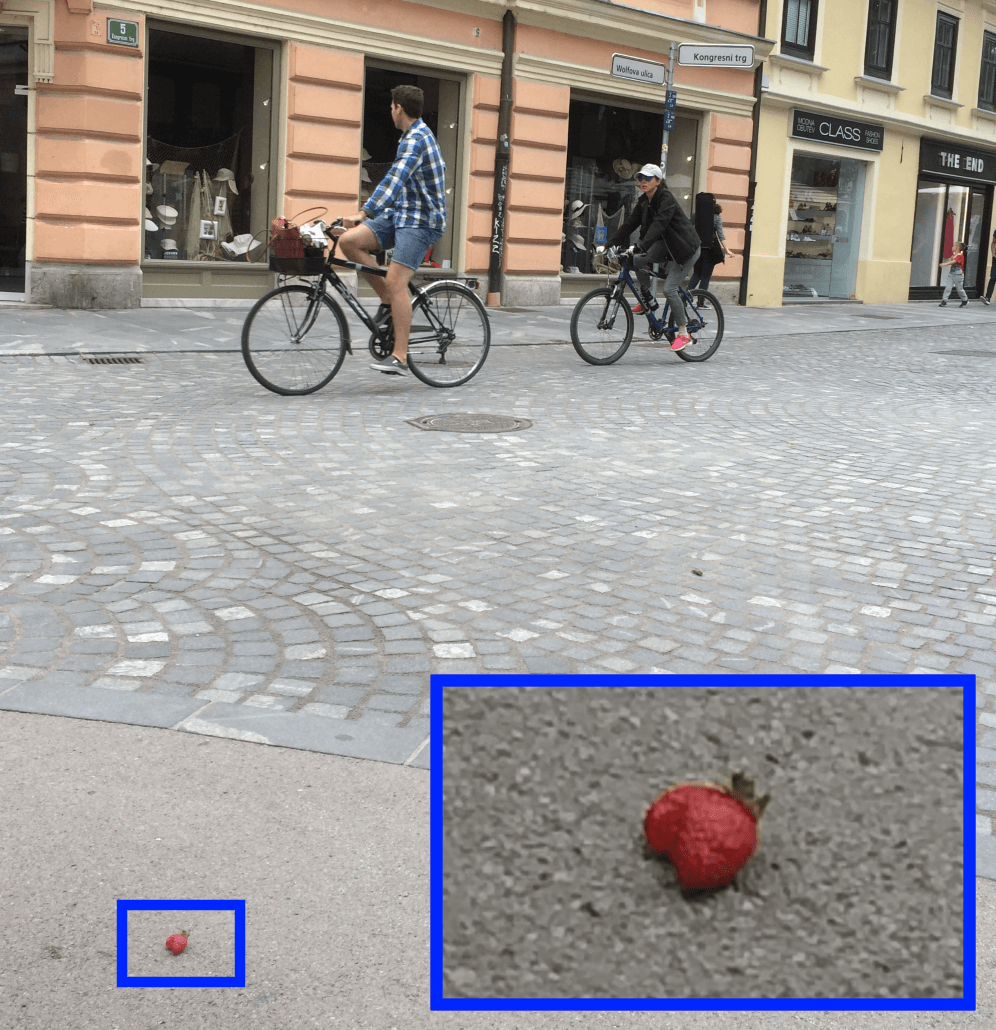
The berry in question
The strawberry scene unfolded during our most recent Ljubljana sojourn, an intermittent story that began in 1991. Tank traps, troops and tension we saw back then at Congress Square, across from Zvezda, are long gone, replaced by the EU, the Euro and stability.
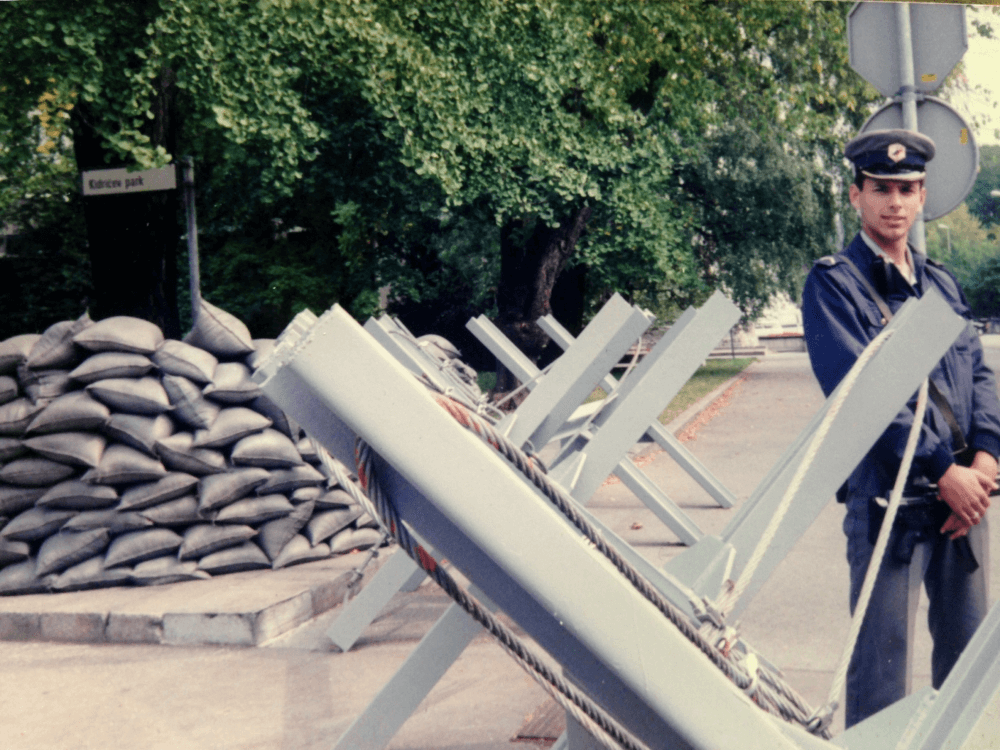
Tank traps in Congress Square, 1991 (Kongresni trg)
Slovenia, mostly unknown then, is now a world destination, attracting ever-growing numbers of visitors, to Bled, Ljubljana, and a slice of the Adriatic. But we worried on this trip, perhaps even facing the dismal prospect of being overwhelmed.
In 1997, I returned to study Slovene, and saw some early changes. In my notebook, I fretted then whether Slovenia could "survive the onslaught of western 'civilization,'" EU membership, and maintain historic links to the Balkans, and their once-fellow Yugoslav citizens. The "fragile beauty and rhythm of the 'club'," which I felt strongly in cozy Ljubljana, could be easily shattered, I wrote, two decades ago.
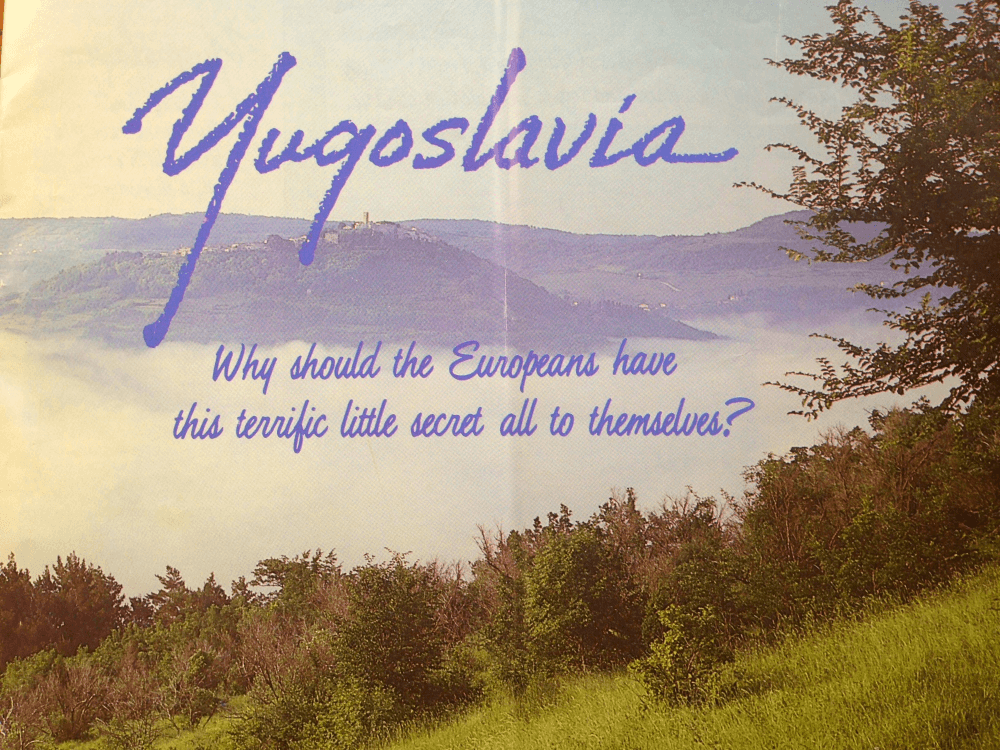
A time before "I feel Slovenia" - "Why should the Europeans have this terrific little secet all to themselves?"
Now, with Slovenia on the map, that seductive "I Feel Slovenia" slogan has worked all too well, no need to be lured. (It came as little surprise that as I finished writing this, Slovenia announced record tourist visits in 2018.) But what is the breaking point? Does a Venice or Amsterdam loom for Ljubljana, and maybe Slovenia, inundated by tourist waves, upending what they had come to experience?
This year, we came in June for three months, my first time as a citizen of Slovenia. Citizenship in the "old country" had always seemed like a crazy pipe dream. But in 2014 I applied, assembling roots records, my multiple newspaper accounts about our repeated visits, and assisted by a Ljubljana friend, a retired lawyer.
All four of my grandparents — John Puc and Johanna Starman, and John Krze and Frances Lustick — migrated a century-plus ago to Rock Springs, an unlikely multi-ethnic, coal-mining town in the high, cold desert of southern Wyoming USA, where I grew up in a sort-of Slovenian enclave. My mother made potica, we bought kisla repa from another family, and kranjska klobasa made by a Slovenian guy who also operated a highway motel. We never missed the yearly "grape festival" at the Slovenski Dom, and one fall Sunday everyone in the family joined my blacksmith grandfather in his basement to grind grapes, shipped to local Slovenes from California.
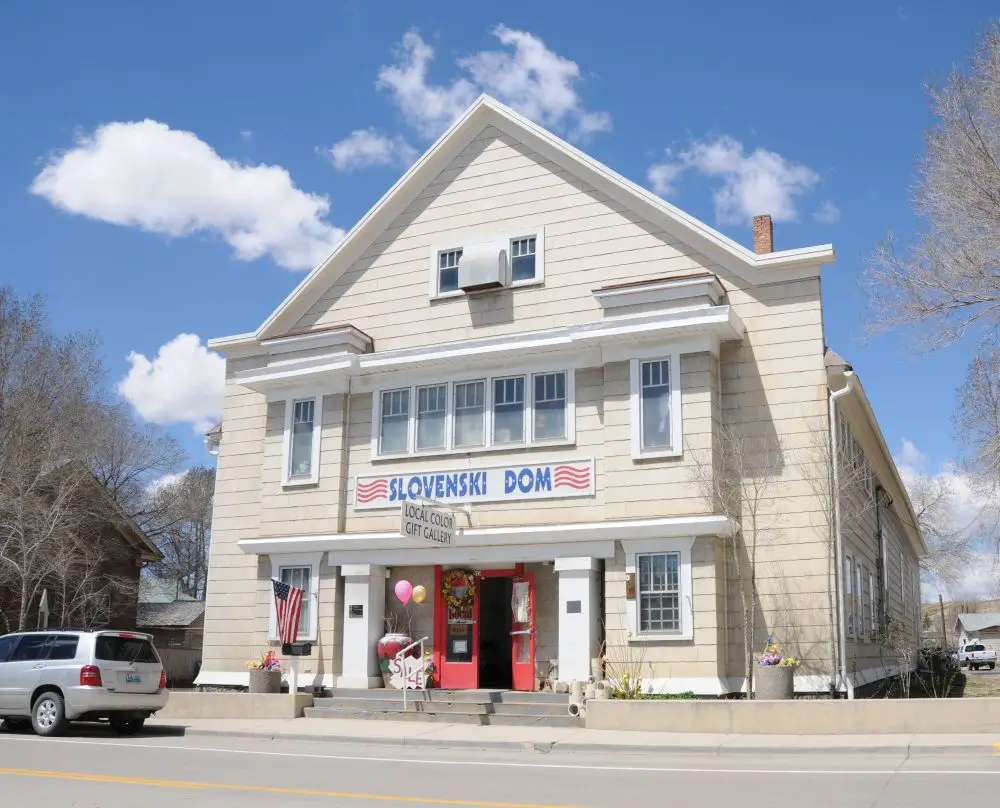
Slovenski Dom, Rock Springs, Wyoming, in 2011. Photo: Yurivict, GNU Free Documentation License
I wrote in my application that I considered citizenship to be fulfilling the dream of one of my grandmothers, who never learned English, always feeling, or so I thought, that one day she'd return to her beloved green Slovenia, leaving that dusty Wyoming desert behind.
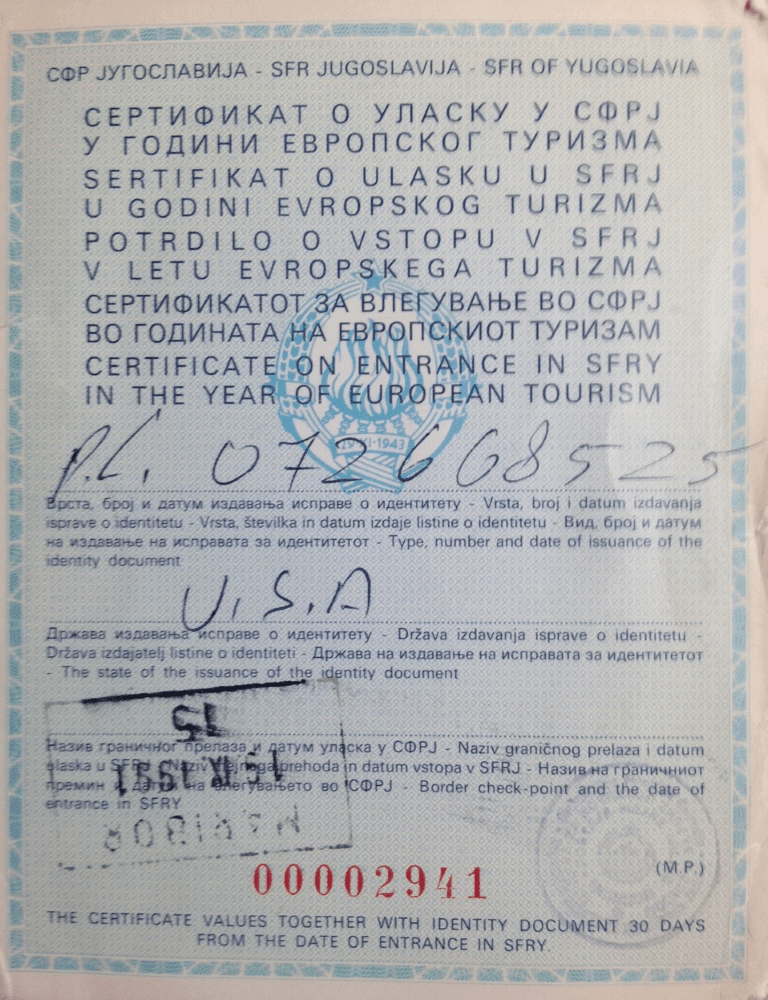
Travel documents from 1991
Back in early 1991, when we had planned our first visit, it was still Yugoslavia. But when we arrived in September, although border guards were handing out SFRY (Socialist Federal Republic of Yugoslavia) "certificates" for travel, almost overnight it had become Slovenia. Despite independence, there was uneasiness. Our friend Stanislav Fortuna stashed gas masks under the couch, at the ready. By the Triple Bridge, currency sellers hawked newly minted Slovenian tolars, beneath Prešeren's statue. The old-line department store, Centromerkur, was still in business (that's where we purchased material Kate only recently used to make kitchen curtains in Albuquerque, New Mexico, where we now reside in the USA). Titova Cesta, the main drag, was virtually empty late nights.
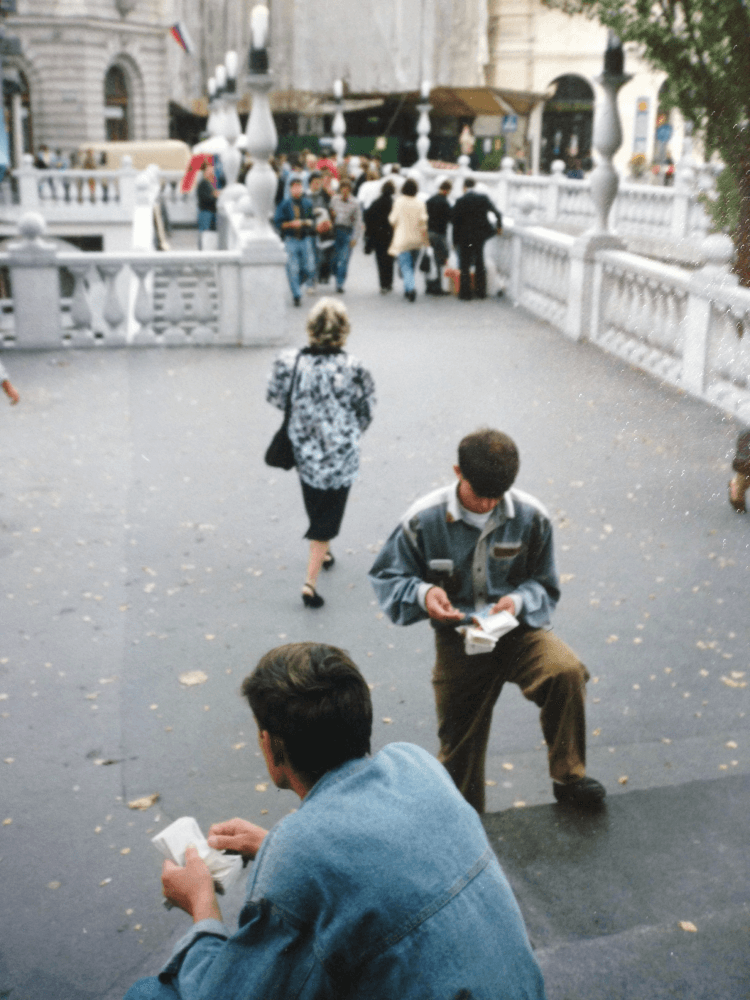
Currency sellers in Prešeren, 1991
That's all a distant memory. Centromerkur has vanished, replaced by the trendy Galerija Emporium. No longer is curtain material made in Slovenia, — no, our seller told us this year — all textiles are from Italy.
On the streets of Ljubljana, meanwhile, a more significant change: Increasingly more, and swifter, cars. Vehicle swarms unnerve bicyclists on narrow roadway bike lanes, so they opt for sidewalks. I call it "outsourcing danger," squeezing hapless pedestrians, forced to watch for oncoming and approaching bikes (and even motorcycles!) on what were sidewalks supposedly reserved for walkers. POZOR! That became our byword as pedestrians, which we are because we prefer foot, bus or train.
Bicyclists have also become more aggressive. They no longer "behave normally," Stanislav says. He's been riding bikes for nearly seven decades, he says, but now feels uncomfortable on the increasingly fast-paced streets.
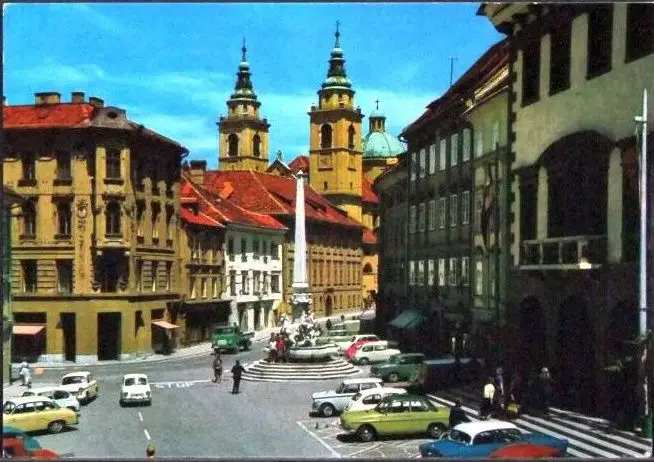
Postcard of Town Square, 1969. Wikimedia, public domain
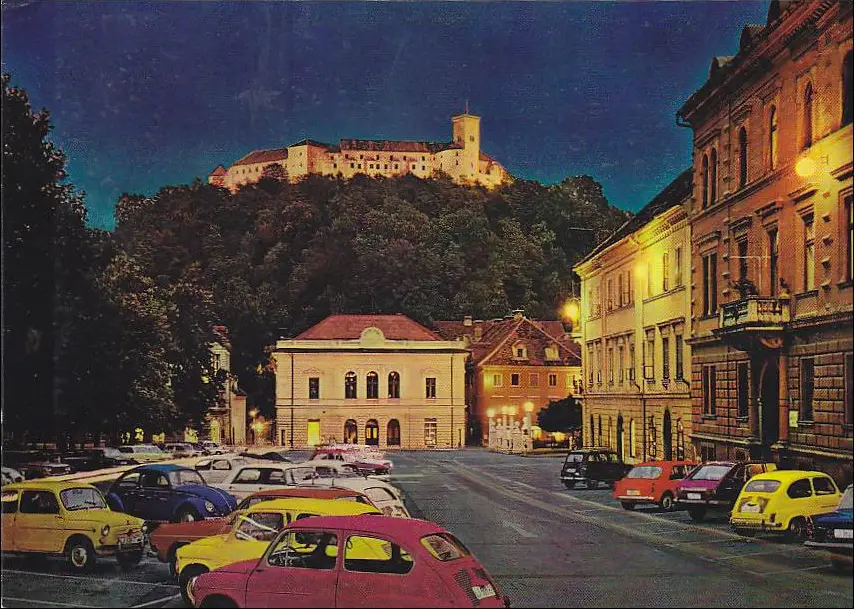
Postcard of Congress Square, 1969. Wikimedia, public domain
Also, less cars! It's a delight to walk the Triple Bridge, passed Prešeren, without dodging smoking autos and lumbering buses, the way we saw it in 1991. Tito's name has been scratched, and now Slovenska Cesta is off-limits to cars (mostly), for buses and walkers only. Now that's a refreshing change, promoting pedestrianism.
But bigger, better, faster — an unsavory USA import — has, alas, afflicted Ljubljana. Thankfully, pedestrian markings on streets still stop cars, though it's smart to glance left and right, just to be sure.
Surprisingly, there was little mention of Melania Trump, the Slovenian-born export to the USA, who left for bigger things and bright New York lights. The one-page In Your Pocket Guide writeup on Sevnica, her birthplace, doesn't even mention her. The only signs of Melania we saw were "first lady" products, tagged to fend off lawsuits she's filed to protect her name.
On the housing front, other changes. When I arrived in 1997 for language study, only three private rooms were for rent, one on Friskovec, where I stayed until relocating to a student dorm near Bezigrad. Now, hostels, hotels and Airbnbs abound, even in Mestni Trg, all of this giving neighborhoods a less-permanent feel.
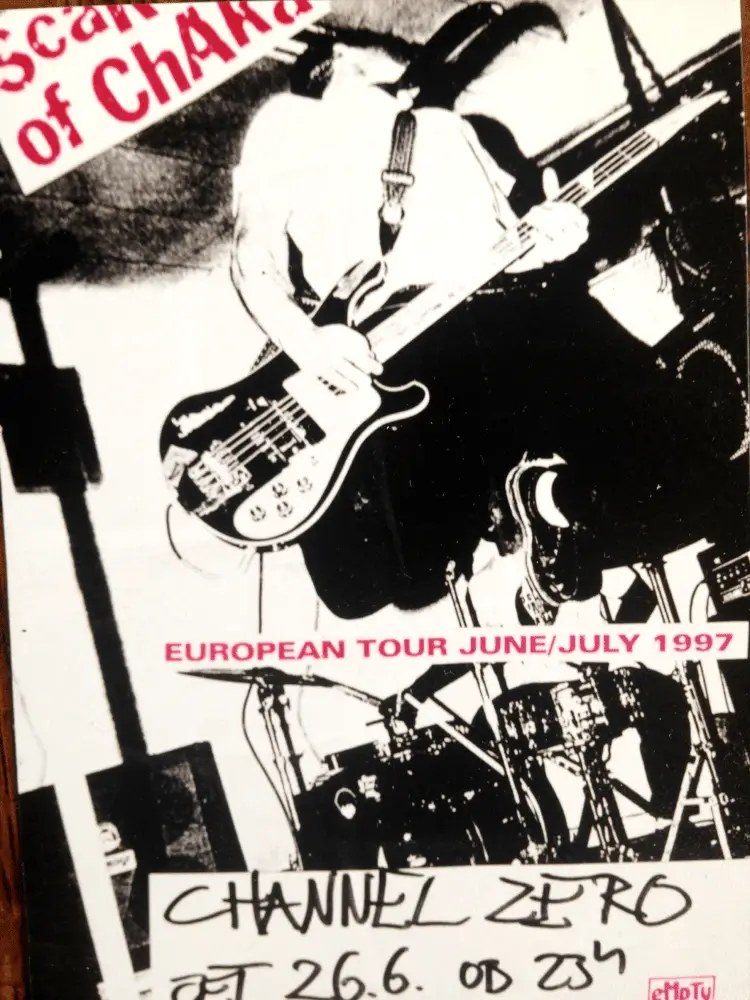
It was when I was at Friskovec that I found Metelkova, in its early raw stages, a time of honest energy and creativity. One late night I heard drums, and wondered what was up behind the walls on the street. The next night, I found out, through a newly opened hole, and happened upon Channel Zero, and a punk band passing through — Scared of Chaka, coincidentally, from Albuquerque, USA. I'm from Wyoming, I told a shocked Dave Hernandez, the band's frontman, who later formed a more widely popular USA band, The Shins.
A 2018 whirl through Metelkova left us feeling differently. Recent fires, a spat of sleazy characters milling about and police wandering around offered a different vibe. At Celica — an abandoned prison in 1997 — cordialness lingered, though one worker lamented that with the takeover by the company managing the Castle, a more mainstream and profit-oriented operation loomed.
Related: Celica - Former Prison, Hostel, & Full Artistic Experience in Ljubljana’s Metelkova
Down by Prešeren, other changes. By August, swelling tourist crowds intent on discovering "Europe's best-kept secret" noticeably thickened, at Trubarjeva, the Triple Bridge and the dragons. The crowded frenzy, unlike the 1990s and even latter-years Ljubljana, was amplified by street performers — a non-local mishmash of maddening, out-of-place bongos, incessant mandolins and disruptive break dancers. We longed for the Romani band that frequented the bridges, in 2014 and 2015, to feel that real Balkan beat, and felt sorry for the drowned-out, lone Slovenian accordionists cast into the sonic shadows.
To experience old-country spirit and heart, we left Ljubljana, for the out-of-the-way. By pure chance, we had met Sonja Bezjak at Carlos Pascual's "Pocket Teater." Even more fortunately, her home was near the Mura River in little-touristed northeast Slovenia, a region Kate by coincidence was reading about in Feri Lainscek's novel, Murisa.
Related: Slovenia's Foreign Entrepreneurs: Carlos Pascual, Working Writer
We drove with her to Ljutomer, where Slovenian language blossomed. Then, to Trate, her home, near an aging castle that housed mental patients where she and other volunteers established a "museum of madness," to focus on perceptions of mental health. We floated the Mura, and met stalwart river-protectors fending off misguided hydropower developers, an effort that's succeeded in getting UNESCO status for the river ecosystem.
Sonja's parents prepared a garden-fresh vegetable dinner, evoking that Slovenia past now receding all too quickly. It was all like a dream, I told them, recalling my grandparents' kitchen table in Rock Springs, my grandmother making lunch for my grandfather who walked from his blacksmith shop.
We returned, and lingered a bit longer in Ljubljana, lamenting our impending departure. One of our last stops was at Zvezda, and my strawberry watch. Alas, fate finally intervened. I glanced away for a moment, and when I looked back, the berry was smashed on the sidewalk.
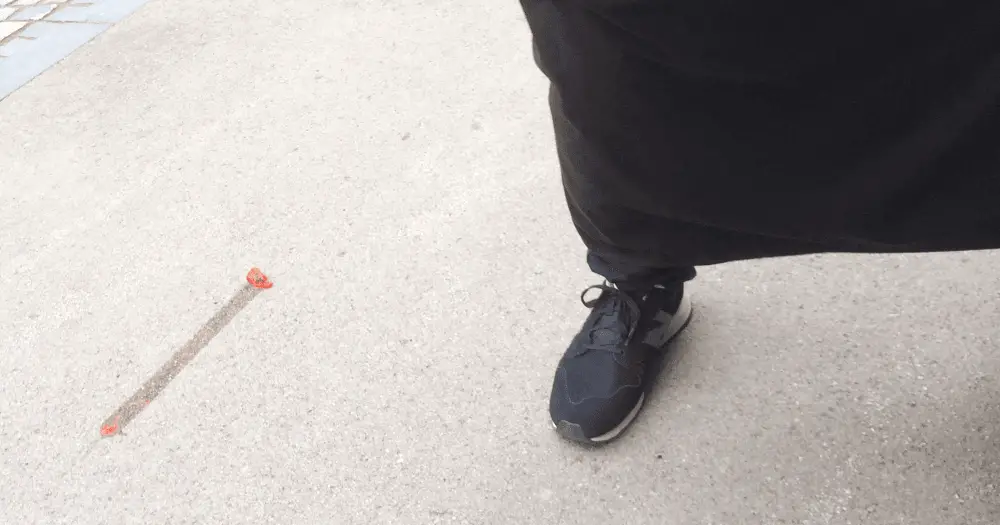
I recalled my sort-of life mantra — nothing, no matter how delicious and wonderful, lasts forever. Likewise, it may be, to our dismay, and my grandmother's dream genes, the way of Ljubljana, and Slovenia. Perhaps I'm wrong, and anyway we're still coming back, to savor ambiance of the "club," deep friendships, and drink from that well of wonderfulness, while we can. But I think I'll just stop telling folks what a swell place it is, lest they may actually all come, eroding our pleasantness.
If there’s a story you’d like to share about Slovenia, then please get in touch at This email address is being protected from spambots. You need JavaScript enabled to view it.
STA, 8 January 2019 - The new US ambassador to Slovenia, Lynda Blanchard, ought to have started her posting a while ago, but her arrival, along with the posting of many other candidates, has been held up by procedural obstacles related to the election of the new US Congress.
Because the Senate did not confirm her appointment by the end of last year, her candidacy was automatically returned to the White House in accordance with the rules of procedure. The White House must now formally submit her candidacy once again.
The US Senate's Committee on Foreign Relations confirmed Blanchard in September 2018 without a glitch, but even though she has to go through the appointment procedure again, a new hearing is not required: in such cases, candidacies are often fast-tracked through the Senate.
But even if this formality is completed, Blanchard's posting could still be delayed by the ongoing shutdown of the US government due to President Donald Trump's dispute with the Democrats over funding for the wall on the border with Mexico.
The State Department is among the federal agencies affected by the shutdown and does not have the funding to function normally. Until regular funding is secured, it only performs urgent tasks.
The last US ambassador to Slovenia, Brent Hartley, completed his term in Ljubljana in July 2018. The US Embassy has since been headed by charge d'affaires Gautam Rana.
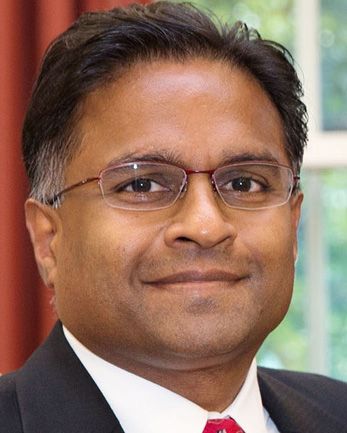
Mr Gautam Rana, whose details can be seen here. Photo: si.usembassy.gov
Related: The Summer Economics Institute Builds Links Between Slovenian and American Students




